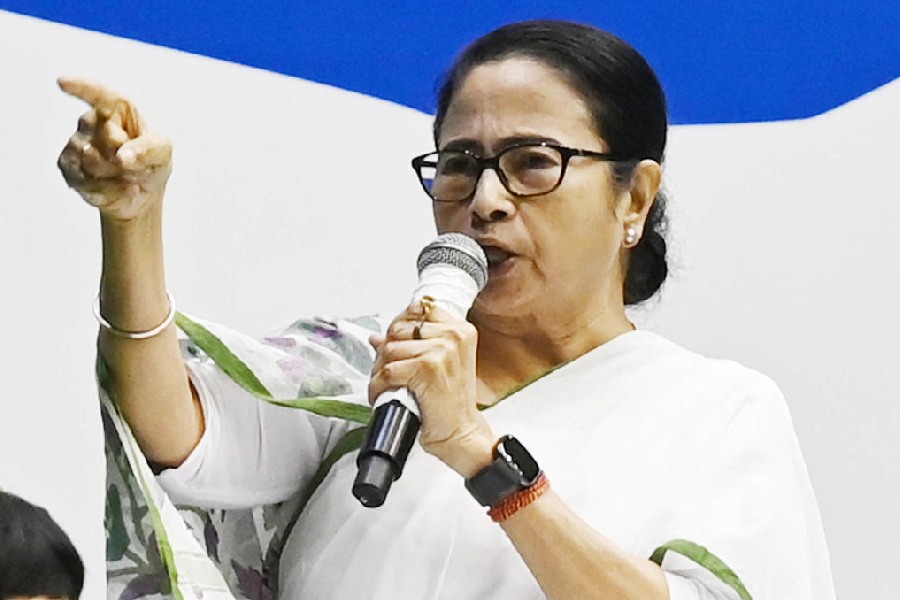Image Source: Telegraph India
On Thursday, Mamata Banerjee addressed a rally about recent criticisms levied against her party and state by Prime Minister Narendra Modi and the Bharatiya Janata Party (BJP). Embracing the rally’s theme of “Mahilader Adhikar, Amader Angikar” (women’s rights, our commitment), Banerjee stood at the forefront, leading the march in her signature style.
Responding directly to the allegations of women being unsafe in Bengal, particularly in light of the Sandeshkhali issue, Banerjee vehemently defended her state’s record. She stated that the women in Bengal are safe under regime. This statement encapsulated her firm belief in the safety and security of women under her administration.
The Chief Minister also responded to the claims that she was protecting the main culprit in the Sandeshkhali issue. Without directly naming the arrested local Trinamool leaders, Banerjee asserted that her administration takes swift action upon receiving information, even against Trinamool members. Admitting to incidents in Sandeshkhali, she criticized the BJP’s leaders for their silence on crimes against women in states under their governance, especially in Manipur.
Notably, the inclusion of women from Sandeshkhali, where grave accusations against local Trinamool leaders have surfaced, underscored Banerjee’s commitment to addressing concerns and standing in solidarity with all women, regardless of political affiliations.
Joining Banerjee in the march were prominent women Trinamool leaders, including Sushmita Dev, Shashi Panja, and newly-elected Rajya Sabha MP and journalist Sagarika Ghose, alongside Abhishek Banerjee, the party’s national general secretary and Mamata’s nephew.
Table of Contents:
- Mamata-Banerjee-Attacks-PM-over-Sandeshkhali-issue
- BJP-seek-to-gain-from-Sandeshkhali-issue-before-Lok-Sabha-Polls
- BJP’s-fact-finding-team–stopped-from–going-to-Sandeshkhali
- Veteran-TMC-leader-leaves-party-and-joins-BJP
BJP seek to gain from Sandeshkhali issue before Lok Sabha Polls
Image Source: The Sunday Guardian
The Sandeshkhali tragedy presents a critical juncture for the BJP to confront the ruling TMC, leveraging the surging public outrage. Particularly noteworthy is the involvement of women, a crucial demographic for Mamata Banerjee, who have taken to the streets in Sandeshkhali, potentially catalyzing a wider discourse among women across West Bengal. Effectively amplifying this public outcry could significantly reshape the political terrain.
Over the past seven years, the TMC has grappled with numerous corruption allegations, leading to the incarceration of key leaders and ministers. The eruption of violence and alleged atrocities involving TMC members in Sandeshkhali epitomizes the crisis that Mamata Banerjee aimed to avoid. Governance deficiencies within her party have fueled mounting discontent among the populace, creating fertile ground for exploitation by the BJP.
Mamata Banerjee’s history as a formidable opposition figure underscores the pivotal role of public outrage in shaping political narratives. Her leadership during the Singur and Nandigram protests precipitated the downfall of longstanding Left rule.
Now, the BJP stands poised to harness public dissatisfaction and challenge the entrenched power dynamics in West Bengal. The BJP’s adept navigation of this moment could not only reshape the political landscape in West Bengal but also signify broader shifts in state power dynamics in the coming days.
BJP’s fact-finding team stopped from going to Sandeshkhali
Image Source: The Economic Times
BJP’s fact finding team which included women leaders like Agnimitra Paul and Locket Chatterjee, were halted by the West Bengal Police in New Town, Kolkata, on their way to Sandeshkhali. Despite attempts to proceed, a confrontation erupted, resulting in their detainment. The leaders, visibly frustrated, engaged in a sit-in protest at the site of the halt, accusing the police of unjustly obstructing their movement. Among the detained were prominent figures like Asansol Dakshin MLA Agnimitra Paul, Hooghly MP Locket Chatterjee, spokesperson Bharati Ghosh, and party Mahila Morcha president Falguni Patra.
The incident escalated when the police cited law and order concerns as the reason for their intervention, prompting the BJP members to demand proof of any prohibition orders justifying the obstruction. The tense standoff underscores the ongoing political tensions in West Bengal, where clashes between the ruling party and opposition factions have become increasingly common, exacerbating concerns over democratic freedoms and the rule of law.
Veteran TMC leader leaves party and joins BJP
Image Source: The Hindu
Former Trinamool Congress (TMC) stalwart Tapas Roy made headlines on Wednesday as he officially joined the Bharatiya Janata Party (BJP) at a significant ceremony held at the BJP’s Kolkata office, graced by Bengal BJP leader Suvendu Adhikari. Roy’s decision to switch allegiance came after a period of discontent within the TMC, culminating in his resignation from the party earlier in the week. Dissatisfaction with the TMC’s leadership and handling of critical issues, such as the Sandeshkhali village controversy, prompted Roy to part ways with his long-standing political home.
Roy’s departure from the TMC was not a sudden development. Prior to his formal resignation, he had voiced concerns over the party’s internal workings and criticized its leadership for failing to provide adequate support during a challenging period. Notably, Roy lamented the lack of backing from the TMC hierarchy when his residence came under scrutiny during an Enforcement Directorate raid in January, relating to alleged irregularities in civic body recruitments.
Tapas Roy’s political journey spans several decades. Initially elected as an MLA on the Congress ticket from the Vidyasagar assembly constituency in 1996, he later transitioned to the TMC, winning the 2001 assembly elections from Bara Bazar. Over the years, Roy’s political influence expanded as he represented the Baranagar assembly constituency in the North 24 Parganas district since 2011, securing multiple terms as a TMC legislator. Within the TMC, Roy held the position of deputy chief whip, further solidifying his stature within the party ranks.
Roy’s defection to the BJP signifies a significant political shift in West Bengal’s landscape, indicating the BJP’s growing influence and the challenges faced by the ruling TMC. As Roy aligns himself with the BJP, his move could potentially sway political dynamics and influence future electoral outcomes in the region.

1 Comment
Pingback: Kolkata Building Collapses, 5 people die...